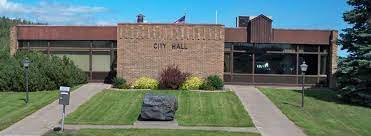Silver Bay City Council Learns About Light Pollution and Astro Tourism.
Did you know that Minnesota has more dark sky (night sky not dimmed by light pollution) than any other state east of the Mississippi River? Todd Burlet, from Starry Skies North, was at Monday night’s City Council meeting to talk about the problem of light pollution and its effects on both people and the environment. He also talked about the growing Astro Tourism industry and encouraged communities along the North Shore to take advantage of the fact that we live in an area where dark skies are prevalent.
There are a number of ways that light pollution is problematic. For example, there has been a 40% decline in songbird populations over the last 50 years. Migrating birds tend to travel at night. As they pass over cities, light pollution obscures the stars which they use for navigation. Birds then become trapped in the maze of reflected light from windows to the point of flying into buildings or collapsing from exhaustion in their confusion.
The human impacts of light pollution include disruption in both melatonin production and circadian rhythms which are necessary for a healthy sleep cycle. Disturbed sleep increases the risks of sleep disorders and may lead to cardiovascular disease, depression and other maladies.
Burlet reminded those at Monday night’s meeting that night is a habitat that should be protected for the health of our environment. Salmon, bass and walleye are all impacted by artificial light when it encroaches on their nighttime habitat. Microbes that eat algae blooms come to the surface of lakes at night to feed. Light pollution interferes with this process.
We tend to believe that lighting everything up at night improves safety. This is not always the case. In reality, poorly aimed lights can actually lead to glare which, in turn, leads to traffic accidents involving pedestrians and automobiles. A study done by the city of Chicago found that crime increased by 21% after alley lighting was increased in both wattage and frequency in 2000. Burlet stated that lighting up at night can give one a false sense of security in that it helps a would-be burglar see more clearly, making it easier to commit a crime.
35% of light is wasted by poorly aimed and poorly controlled outdoor lighting. Some remedies for this include being more mindful about how we light up our properties at night. People are encouraged to use warm light LEDs that emit about 3000 kelvins rather than brighter blue-rich white light bulbs. Pole lights can be aimed at the ground so that they don’t produce glare. Additionally, folks can use motion-sensitive lights to reduce both electrical costs and light pollution.
Astro tourism was the other topic that Burlet spoke about. There is a growing interest in star gazing, as evidenced by the number of businesses that are offering astronomy-related opportunities for tourists. The Gunflint Trail and Luteson offer astronomy vacation packages. Duluth has a Celebrate the Night Week and Grand Marias offers Dark Sky Caravan Sky Parties. The best Aurora viewing in the lower 48 states are in Spring and Fall. Astro tourism clearly offers an opportunity for economic development along the North Shore.
In other business, the public library will be holding a fundraising event on Friday, February 10th from 6 – 8 PM. The Council adopted a measure to pursue a Fema grant to provide protective breathing equipment for the Fire Department. The Council also approved the hiring of an additional personnel which will bring the strength of the Department to 18 firefighters.
City Administrator, Lanna Fralich will be traveling to St. Paul to meet with elected officials and advocate for the needs and concerns of the Silver Bay community. Direct communication between local and State government officials is an important feature of our democratic process.
The City Council will have its next meeting on January 21st at 7:00 PM. Interested residents are encouraged to attend either in person or via Zoom.




